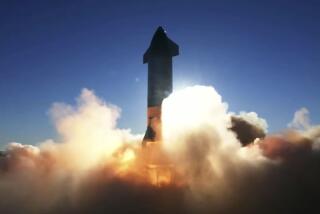Test Launch Set for Private Space Station
A hotel tycoon’s dream of building an inflatable commercial space station is taking a step toward reality -- or a reality check -- with the launch of a satellite to test the technology behind the planned orbital outpost.
The fact-finding mission scheduled for this week will explore the feasibility of Robert Bigelow’s plan to build a working commercial space complex by 2015.
When finished, it would consist of balloon-like modules strung together like sausage links and serve as an orbiting space hotel, laboratory, college or entertainment venue.
The planned liftoff from Russia of Bigelow Aerospace’s privately funded Genesis I spacecraft will mark the beginning of the start-up’s attempt to break into the fledgling manned commercial spaceflight business.
Bigelow, who made his fortune with the Las Vegas-based Budget Suites of America hotel chain, has remained mum about the exact launch date of the prototype. But the Russian space agency Roskosmos reported posted on its website that Genesis was scheduled to launch today aboard a converted Cold War ballistic missile from the Dombarovsky missile base in the southern Ural Mountains.
Genesis I is a one-third scale model of a commercial space station that the company eventually hopes to fly humans in. It is outfitted with 13 interior and exterior cameras to shoot video and photos of the Earth.
Unlike the rigid aluminum modules that make up the international space station, the inflatable design consists of a flexible outer shell that can be expanded in space. The module is padded with layers made of tough materials including Kevlar, the stuff of police vests, to withstand speeding cosmic debris.
Inflatable technology isn’t new. NASA researched the concept in the 1990s for a potential trip to Mars, but later abandoned it after determining that the huge pop-proof balloons were too costly. Bigelow Aerospace essentially picked up the project.
Once in orbit, Genesis I will expand and circle the Earth for several years while scientists collect information about its durability and other capabilities.
Bigelow, who did not return a call for comment Tuesday, has pledged to invest $500 million to build a commercial space station. About $75 million has been spent so far, according to his company’s website.
In the fall, Bigelow Aerospace plans to launch a spacecraft called Genesis II to further study inflatable technology. Unlike its approach with Genesis I, the company plans to commercialize the mission and is currently taking orders to fly personal photos and mementos from the public aboard Genesis II for $295 a piece.
Over the next two years, Bigelow Aerospace expects to test larger prototype models that will carry life-support systems, including a full-scale mock-up planned for 2012.
Just don’t call Bigelow’s commercial space station a hotel.
“Bigelow Aerospace is not in the hotel business,” the entrepreneur said on his website. “We are in the business of creating structures for other people to use.”
The company previously said it expected the inflatable space station to be a destination for space tourists and leased out to companies that could benefit from a zero-gravity environment.
The cost of flying to Bigelow’s planned space habitat is expected to be less than the reported $20 million to go aboard the international space station.
Other firms trying to break into the commercial space business are designing suborbital spaceships to fly paying tourists.
To ensure that a vehicle can reach Bigelow’s planned outpost, the entrepreneur created the $50-million America’s Space Prize to spur development of a private orbital spacecraft that could dock with his inflatable space station.
More to Read
Inside the business of entertainment
The Wide Shot brings you news, analysis and insights on everything from streaming wars to production — and what it all means for the future.
You may occasionally receive promotional content from the Los Angeles Times.










